13 Best Herbal Teas For Shortness Of Breath
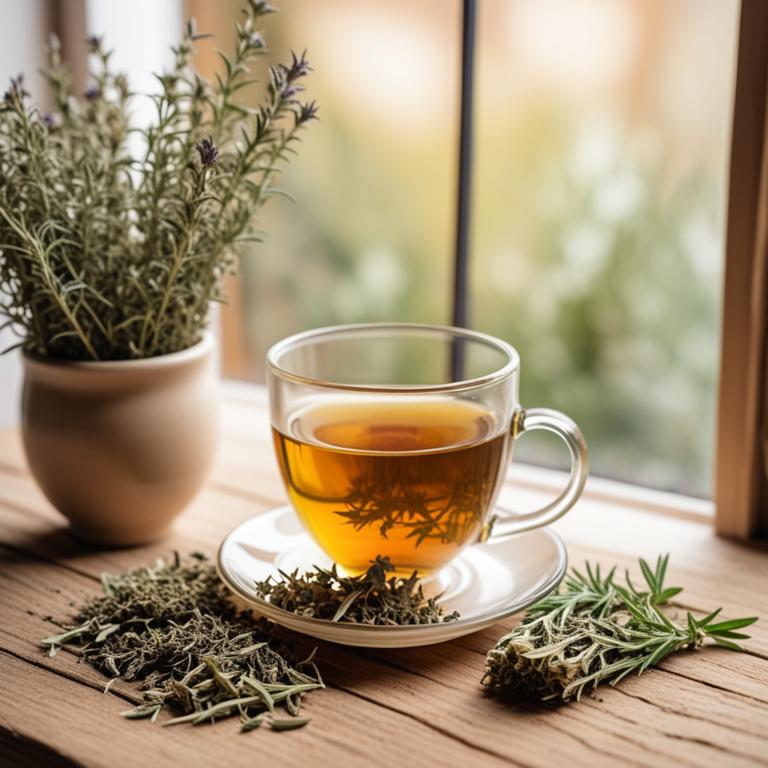
Herbal teas for Shortness of breath are a type of medicinal tea that helps alleviate symptoms associated with respiratory issues, such as difficulty breathing, wheezing, and chest tightness.
These teas have been used for centuries to provide natural relief and are known to offer several benefits, including reducing inflammation, improving lung function, and calming the respiratory system.
Examples of herbal teas used to treat shortness of breath include peppermint tea, which helps to relax the airways and ease congestion; ginger tea, which reduces inflammation and soothes the throat; thyme tea, which has antimicrobial properties that combat infections; eucalyptus tea, which opens up airways and relieves congestion; licorice root tea, which soothes the respiratory tract and reduces inflammation; and passionflower tea, which calms the nervous system and promotes relaxation.
By incorporating these herbal teas into your daily routine, you can find natural relief from shortness of breath and improve your overall respiratory health.
According to "Phytomedicine : international journal of phytotherapy and phytopharmacology", teas for shortness of breath that may be beneficial include those containing gallic acid and quercetin, as well as others derived from plants such as Scutellaria baicalensis Georgi, due to their antioxidant, anti-inflammatory, and anti-apoptotic properties.
Below there's a list of the 13 best herbal teas for shortness of breath.
- 1. Verbascum thapsus teas
- 2. Ginkgo biloba teas
- 3. Astragalus membranaceus teas
- 4. Angelica sinensis teas
- 5. Ilex paraguariensis teas
- 6. Panax ginseng teas
- 7. Echinacea purpurea teas
- 8. Glycyrrhiza glabra teas
- 9. Lavandula angustifolia teas
- 10. Schisandra chinensis teas
- 11. Silybum marianum teas
- 12. Curcuma longa teas
- 13. Thymus serpyllum teas
Also you may be interested in...
TODAY'S FREE BOUNDLE
Herb Drying Checklist + Herbal Tea Shopping List + Medicinal Herbs Flashcards
Enter you best email address below to receive this bundle (3 product valued $19.95) for FREE + exclusive access to The Aphotecary Letter.
$19.95 -> $0.00
1. Verbascum thapsus teas
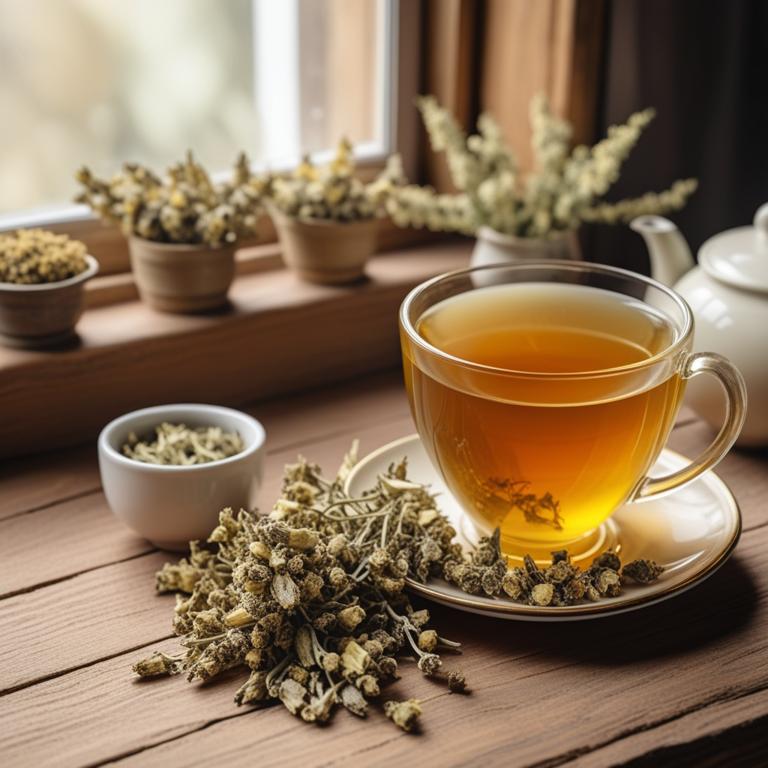
Verbascum thapsus teas, also known as mullein tea, have been traditionally used to treat shortness of breath due to its anti-inflammatory and expectorant properties.
The herbal preparation helps to treat this ailment by soothing the respiratory tract, reducing inflammation, and promoting the removal of mucus, making it easier to breathe.
The bioactive constituents of Verbascum thapsus teas, including flavonoids and saponins, help to reduce inflammation, relax airway muscles, and increase lung function, thereby alleviating shortness of breath.
By consuming Verbascum thapsus teas, individuals can benefit from its natural expectorant properties, improved lung function, and reduced inflammation, making it a potential natural remedy for treating shortness of breath.
2. Ginkgo biloba teas

Ginkgo biloba teas have been used to help alleviate shortness of breath by improving lung function and increasing oxygenation of the body.
The herbal preparation contains bioactive constituents such as flavonoids and terpenoids, which help to dilate blood vessels and reduce inflammation in the lungs, making it easier to breathe.
Ginkgo biloba teas also have antioxidant properties that help to protect the lungs from oxidative stress and damage caused by free radicals, further contributing to improved respiratory function.
The benefits of using Ginkgo biloba teas to treat shortness of breath include improved oxygenation, increased endurance, and enhanced overall respiratory health.
3. Astragalus membranaceus teas
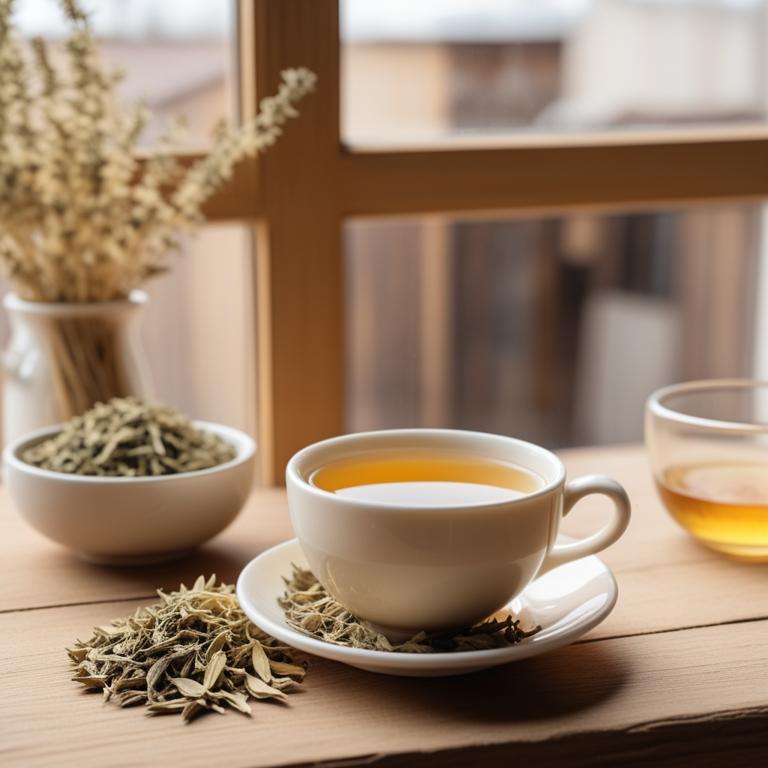
Astragalus membranaceus teas, also known as Huang Qi, have been traditionally used to treat shortness of breath due to their adaptogenic and anti-inflammatory properties.
These properties help to reduce stress and anxiety, which can exacerbate respiratory issues, and also alleviate inflammation in the lungs.
The bioactive constituents of Astragalus membranaceus, including flavonoids, saponins, and polysaccharides, help to promote lung function and improve oxygenation.
By consuming Astragalus membranaceus teas, individuals can experience benefits such as reduced symptoms of shortness of breath, improved lung function, and enhanced overall respiratory health.
4. Angelica sinensis teas
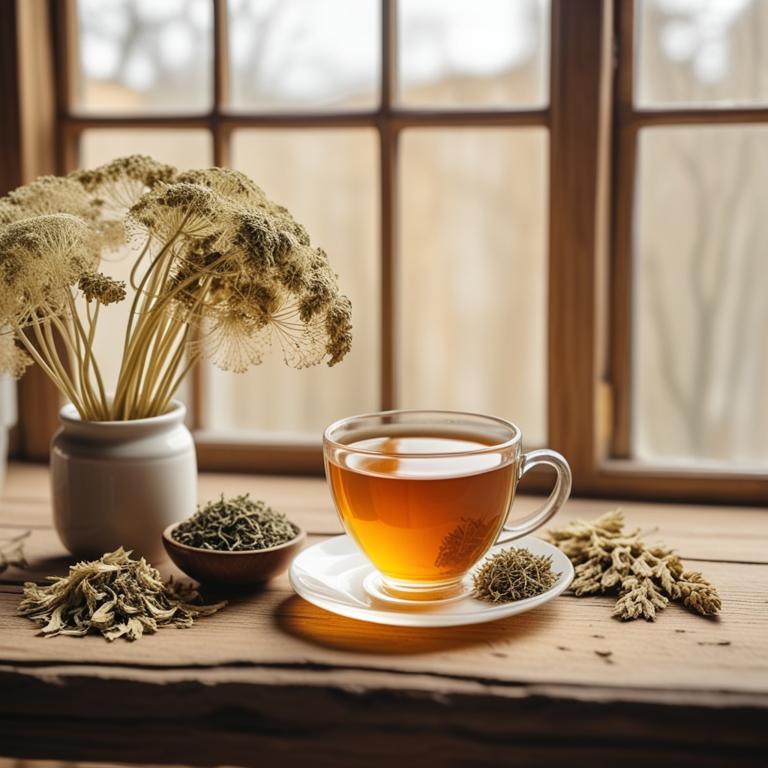
Angelica sinensis teas, also known as dong quai, have been traditionally used to treat shortness of breath due to their adaptogenic, anti-inflammatory, and antioxidant properties.
The herbal preparation helps to treat this ailment by promoting blood circulation, reducing inflammation, and improving lung function, thereby alleviating symptoms of shortness of breath.
The bioactive constituents of Angelica sinensis teas, including ferulic acid, ligustilide, and butylphthalide, are responsible for their therapeutic effects, which help to relax airway muscles and increase oxygenation of the body.
The benefits of using Angelica sinensis teas to treat shortness of breath include improved respiratory function, reduced inflammation, and enhanced overall well-being, making it a popular natural remedy for this condition.
Related Study
According to "Journal of ethnopharmacology", Angelica sinensis teas may help alleviate shortness of breath by inhibiting inflammatory factor release and anti-oxidative injury, which are involved in the mechanisms of treating interstitial lung disease.
5. Ilex paraguariensis teas
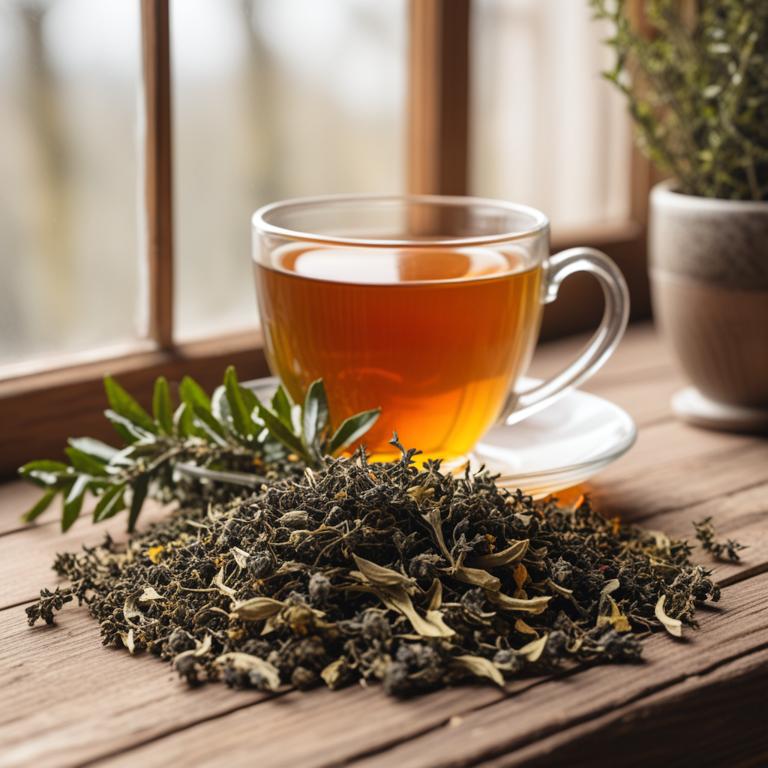
Ilex paraguariensis teas, also known as yerba mate, have been traditionally used to alleviate shortness of breath by promoting relaxation and reducing inflammation.
The properties of yerba mate that help to treat this ailment include its antioxidant and anti-inflammatory properties, which contribute to its ability to calm the airways and improve respiratory function.
The bioactive constituents of yerba mate, such as theophylline and theobromine, have been shown to help relax the airways, improve oxygenation, and reduce inflammation, ultimately alleviating shortness of breath.
The benefits of using yerba mate teas to treat shortness of breath include improved respiratory function, reduced symptoms, and enhanced overall well-being, making it a popular natural remedy for this condition.
6. Panax ginseng teas

Panax ginseng teas have been traditionally used to help alleviate shortness of breath in individuals, particularly those suffering from respiratory conditions such as chronic obstructive pulmonary disease (COPD).
The herbal preparation's adaptogenic and antioxidant properties help to reduce inflammation and improve lung function, making it easier to breathe.
Key bioactive constituents, including ginsenosides and panaxans, work synergistically to enhance oxygen delivery to the body's tissues and reduce oxidative stress.
By utilizing Panax ginseng teas, individuals may experience improved respiratory health and a reduction in symptoms associated with shortness of breath.
Related Study
According to "The European respiratory journal", Panax ginseng teas showed significant intergroup differences for one or more outcomes in treating chronic obstructive pulmonary disease, which may help alleviate shortness of breath.
7. Echinacea purpurea teas

Echinacea purpurea teas are a natural herbal remedy that may help alleviate shortness of breath by reducing inflammation and improving respiratory function.
This herbal preparation contains bioactive constituents such as alkylamides, caffeic acid derivatives, and volatile oils, which work together to combat oxidative stress and promote relaxation.
The anti-inflammatory properties of Echinacea purpurea teas help to soothe airways and reduce congestion, making it easier to breathe.
By consuming Echinacea purpurea teas, individuals may experience relief from shortness of breath and other respiratory issues, thanks to its calming and anti-inflammatory effects.
Related Study
According to "Molecular nutrition & food research", Echinacea purpurea teas do not appear to be a risk to consumers for shortness of breath, with an estimated risk of 1 in 100,000 and fewer than 100 reported adverse events.
8. Glycyrrhiza glabra teas

Glycyrrhiza glabra teas, derived from the roots of the licorice plant, have been used to treat shortness of breath due to their anti-inflammatory and expectorant properties.
The flavonoids, saponins, and glycyrrhizin present in these teas help to reduce inflammation in the lungs and airways, making it easier to breathe.
By loosening and removing mucus from the respiratory tract, Glycyrrhiza glabra teas facilitate improved airflow and alleviate shortness of breath.
The benefits of using these teas include reduced coughing, improved oxygenation, and enhanced overall respiratory health, making them a natural and effective remedy for this common ailment.
9. Lavandula angustifolia teas

Lavandula angustifolia teas have been traditionally used to treat shortness of breath due to their expectorant, anti-inflammatory, and bronchodilatory properties.
These properties help to relax the airways, reduce inflammation, and promote the removal of excess mucus, thereby alleviating respiratory congestion and improving breathing.
The bioactive constituents of Lavandula angustifolia, including linalool, linalyl acetate, and camphor, have been found to contribute to its therapeutic effects, helping to calm the nervous system, reduce anxiety, and promote relaxation.
By using Lavandula angustifolia teas, individuals may experience improved respiratory function, reduced symptoms of shortness of breath, and enhanced overall well-being.
10. Schisandra chinensis teas
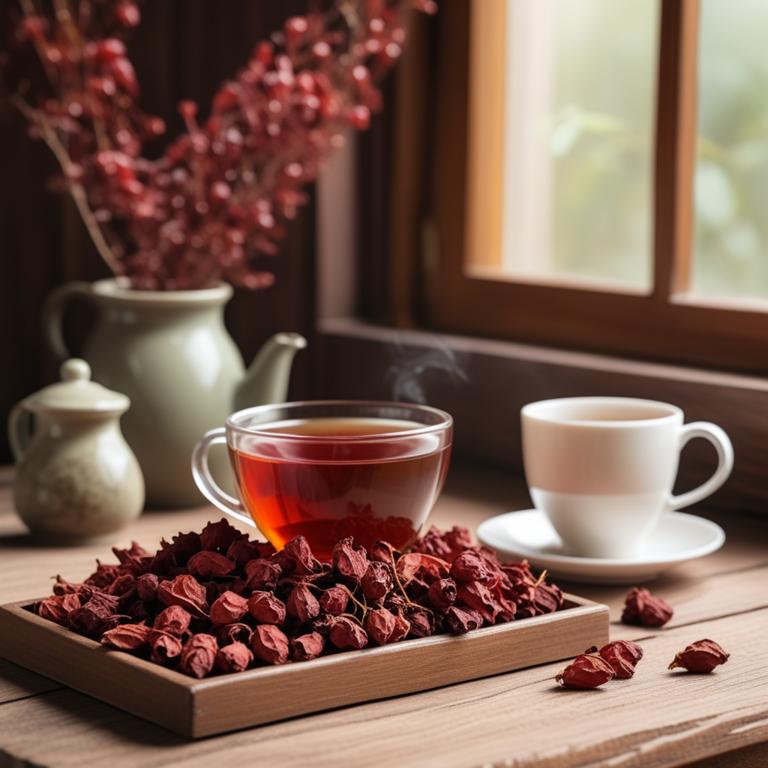
Schisandra chinensis teas, a traditional Chinese medicinal preparation, have been used to alleviate shortness of breath by addressing its underlying causes.
The bioactive constituents of Schisandra chinensis, such as schisandrins and lignans, possess adaptogenic and antioxidant properties that help to improve cardiovascular function, reduce inflammation, and enhance oxygenation of the body.
By promoting cardiovascular health and reducing oxidative stress, Schisandra chinensis teas help to alleviate shortness of breath and improve overall respiratory function.
The benefits of using Schisandra chinensis teas to treat shortness of breath include improved exercise tolerance, reduced fatigue, and enhanced overall quality of life.
11. Silybum marianum teas

Silybum marianum teas, also known as milk thistle tea, have been traditionally used to treat shortness of breath, a symptom often associated with heart failure and other cardiovascular conditions.
The anti-inflammatory and antioxidant properties of this herbal preparation help to reduce inflammation and oxidative stress in the body, thereby alleviating shortness of breath.
The bioactive constituents of Silybum marianum, particularly silymarin, flavonoids, and phenolic acids, contribute to its therapeutic effects by improving heart function, reducing edema, and enhancing overall cardiovascular health.
The benefits of Silybum marianum teas in treating shortness of breath include improved lung function, reduced symptoms of heart failure, and enhanced quality of life.
12. Curcuma longa teas

Curcuma longa teas have been traditionally used to treat shortness of breath, a common symptom of various respiratory conditions, due to its anti-inflammatory and antioxidant properties.
The bioactive constituents, including curcumin, demethoxycurcumin, and bisdemethoxycurcumin, help to reduce inflammation and oxidative stress in the lungs, thereby alleviating shortness of breath.
By modulating the activity of various enzymes and cytokines, Curcuma longa teas help to improve lung function and increase oxygenation of the blood, making it easier to breathe.
The benefits of using Curcuma longa teas to treat shortness of breath include reduced symptoms, improved quality of life, and a decrease in the need for pharmaceutical interventions.
Related Study
According to "International journal for vitamin and nutrition research. Internationale Zeitschrift fur Vitamin- und Ernahrungsforschung. Journal international de vitaminologie et de nutrition", Curcuma longa teas may be beneficial for shortness of breath as they significantly decreased tracheal responsiveness to methacholine in ovalbumin-sensitized rats.
13. Thymus serpyllum teas
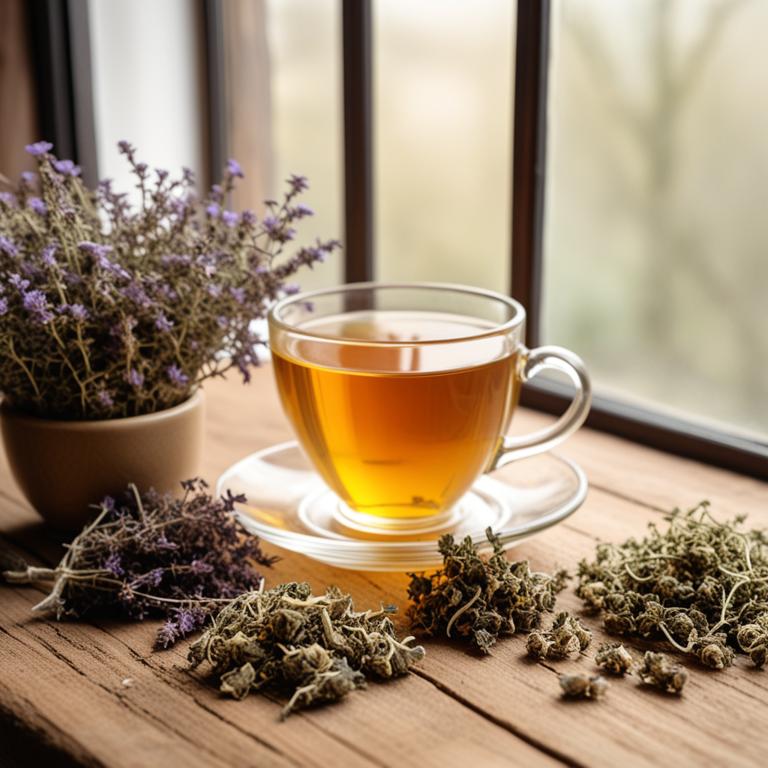
Thymus serpyllum teas have been traditionally used to treat shortness of breath, also known as dyspnea, due to their expectorant and bronchodilatory properties, which help to ease breathing by thinning mucus and relaxing airway muscles.
The bioactive constituents, including thymol and carvacrol, found in Thymus serpyllum teas, possess anti-inflammatory and antispasmodic effects, contributing to their therapeutic benefits in alleviating respiratory issues.
Thymus serpyllum teas help to treat shortness of breath by reducing inflammation and congestion in the airways, making it easier to breathe.
The benefits of using Thymus serpyllum teas to treat shortness of breath include improved respiratory function, reduced symptoms of dyspnea, and a natural alternative to conventional treatments.